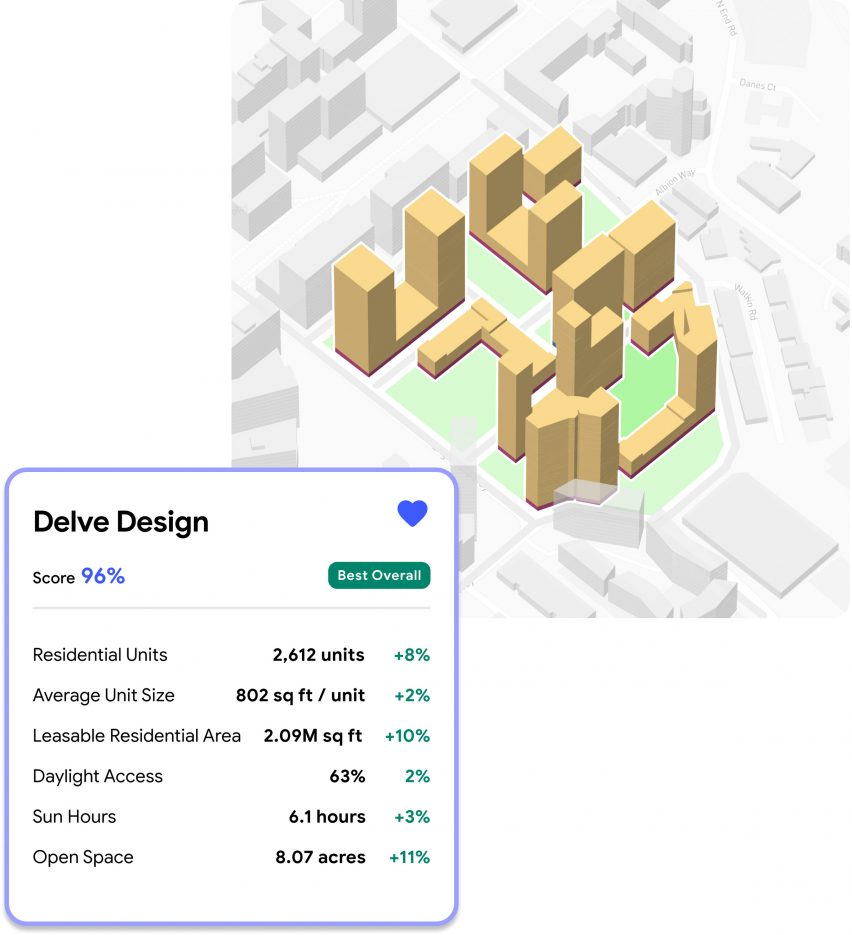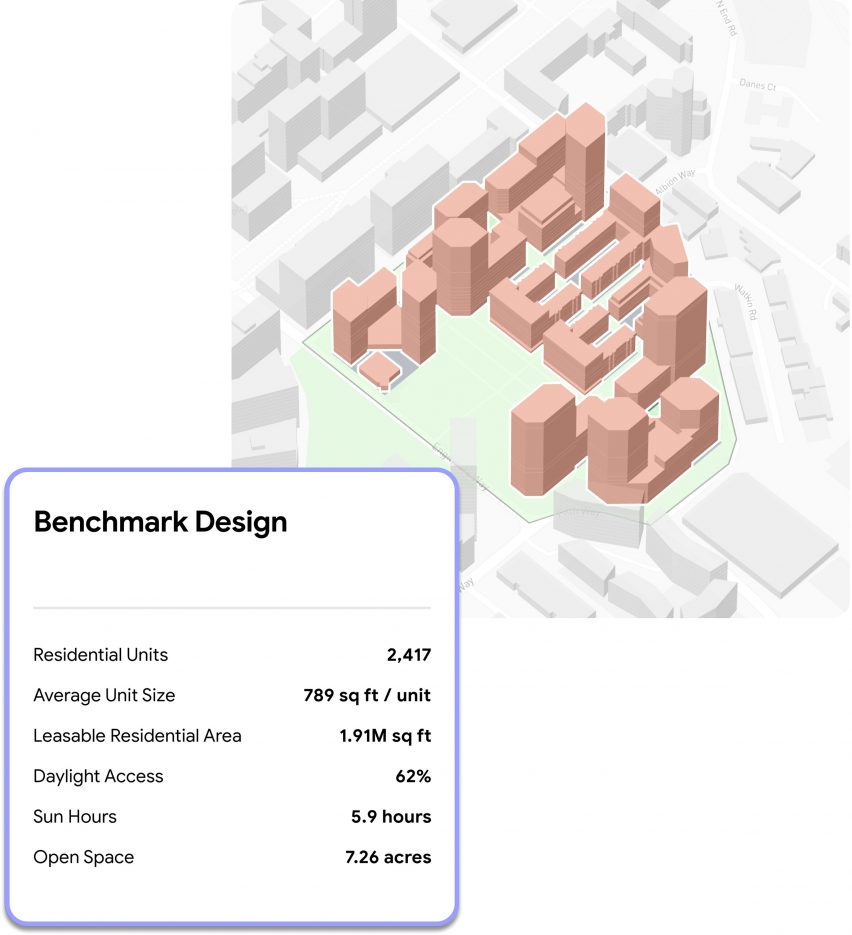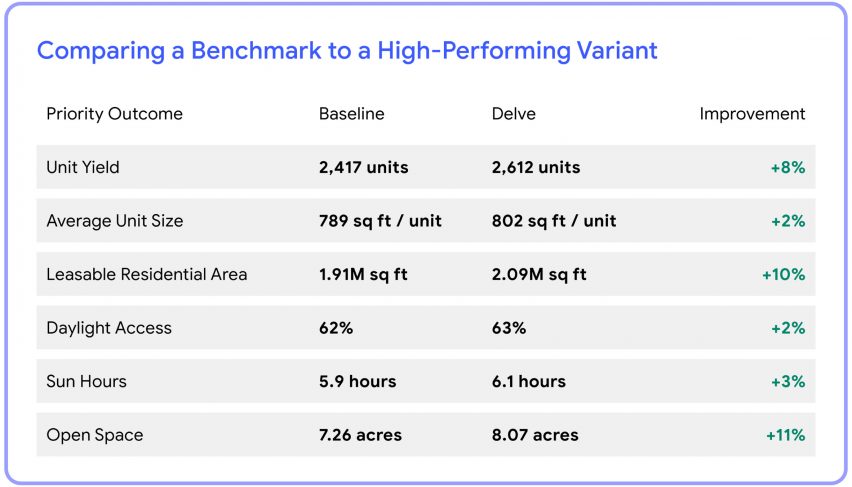 Delve by Sidewalk Labs" width="2332" height="2560" />
Delve by Sidewalk Labs" width="2332" height="2560" />Alphabet subsidiary Sidewalk Labs has launched Delve, a tool that uses artificial intelligence to create "millions of design possibilities" for urban developments in minutes.
Delve creates options based on criteria such as budget, location and size and then ranks them so developers can choose the best design.
The project leverages machine learning, an application of artificial intelligence that uses a base set of data and learns and improves with experience. To create the basis for Delve designs, Sidewalks Labs made a starter model of core components typically used in neighbourhood developments.
"City neighbourhoods have unique personalities, but they also share a lot of the same core components," Sidewalk Labs' director of product management Okalo Ikhena told Dezeen.
"Our team has built a model of these core components that includes buildings, open spaces, amenities, streets, and energy infrastructure," Ikhena added.
"By applying machine learning to that model, Delve explores millions of design possibilities for a given project, measuring the impact of these designs to help development teams arrive at the one that's right for them."
At the start of the process, customers add project information including the planning input, such as the area dedicated to commercial and residential space; site constraints, such as building height limits; and the priority outcomes, including the desired cost and amount of daylight.
Once this is completed Delve generates millions of options with information on how each meets the customer's key priorities – it grades the proposals according to this, so the user can choose the most successful option.
According to Ikhena, Delve stands out because it provides information on "holistic" elements like walkability to amenities, outdoor space and daylight. It assesses the amount of daylight that individual residential units receive, rather than the whole building, so that materials can be chosen accordingly.
 Delve by Sidewalk Labs" width="2332" height="2560" />
Delve by Sidewalk Labs" width="2332" height="2560" />
"Other products only focus on one or a few metrics – they don't evaluate overall quality of life," he said.
"We think designing a district without considering how it will be holistically successful (for daylight, walkability, views, cost) ultimately will not be successful."
Delve is intended to ease the design process, allowing members of project teams to like and comment on models to help the selection process. Users are able to update the project information to make rapid changes to the scheme, with cloud computation helping to create fast results.
"Teams can update their priorities and planning inputs as stakeholder feedback changes, exploring new possibilities in minutes instead of months," Ikhena said.

Customers are given financial models that integrate with their financial spreadsheets, while a built-in utility model forecasts energy requirements. The latter constantly updates so developers can ensure they meet energy efficiency and sustainability goals.
In addition to developing designs from scratch, Delve can be introduced at different stages throughout the development process, from scoping out ideal sites through feasibility assessments to creating alternatives to an existing model.
Developer Quintain recently used Delve to design a Build to Rent scheme on a 12-acre mixed-use development in Wembley Park, near London. The tool created 24 high-performing schemes that exceeded the developer's priorities on daylight, outside space and housing units.

Sidewalk Labs' launch of Delve comes just one year after designer Sebastian Errazuriz predicted that advances in artificial intelligence meant it would soon be possible to tell an app what kind of building you want, describe the budget, location, size and other preferences and get a range of options in seconds.
At the time Errazuriz predicted the rise of machine learning in the design process would result in 90 per cent of architects losing their jobs.
Ikhena, however, has a more positive view on how machine learning can be used to aid the work of architects and designers.
"Delve is providing developers and designers with superpowers!" he said.
"The tool is designed to greatly improve the capabilities of users by automating manual processes (counting apartments of producing area takeoffs) and focusing attention on key strategic decisions (which circulation approach or program mix to test)."
Sidewalk Labs was founded by Alphabet, the parent company of Google, in 2015 to merge technology with urban planning.
The company is best known for its plans to create an experimental smart neighbourhood in Toronto, which was scrapped this year amid "unprecedented economic uncertainty" caused by the coronavirus pandemic.